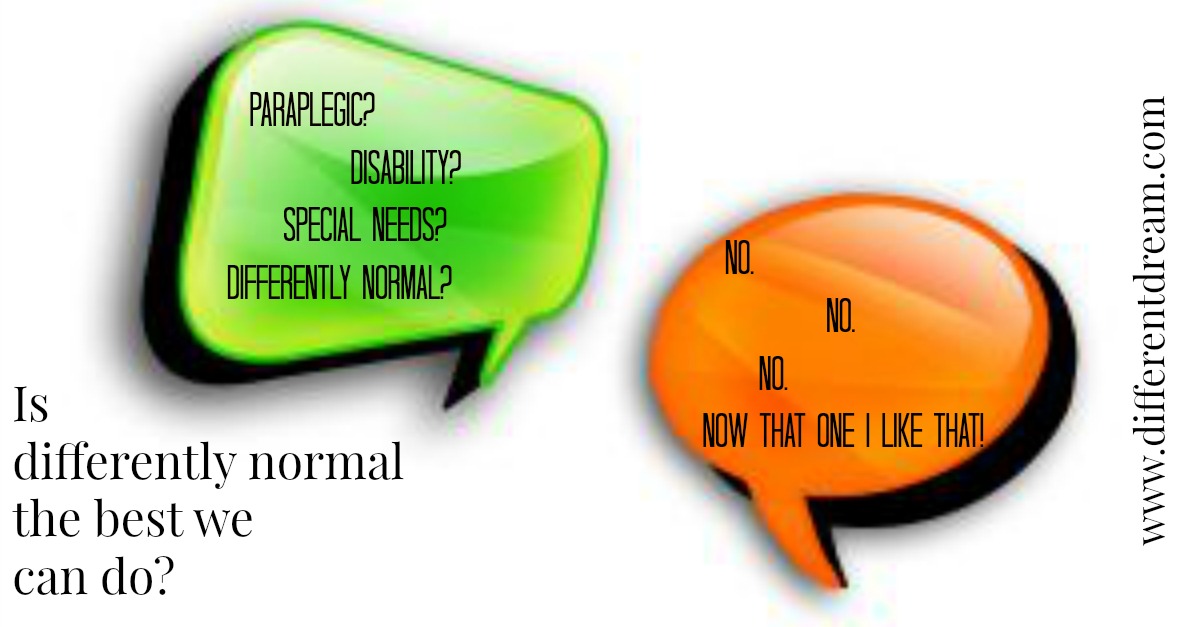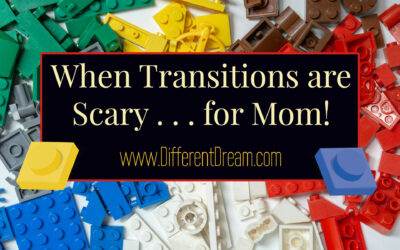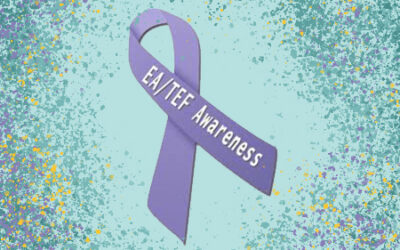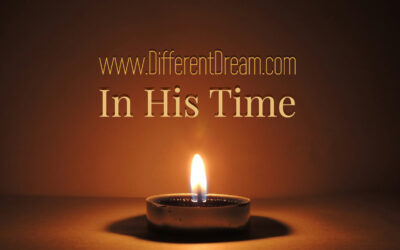Is Differently Normal the Best We Can Do?

Terry Pratchett has a way with words. He’s written oodles of fantasy fiction, and his make-believe worlds are filled with golems, goblins, dwarves, and men. In Making Money some of his human characters discuss politically correct terms for golems, goblins, and dwarves. Finally, they settle on “differently normal” rather than golems, goblins, and dwarves. Which made me laugh.
It also made me think of the present, hot debate in my world about the politically correct way to refer to the special needs disability handicapped differently normal community.
Differently Normal or “Paraplegic Coming Through!”
In a way, the hot debate has been swirling through my life for as long as I remember. For me it began in the early 1960s when our family went to local football games. Dad was in a wheelchair, so mom was allowed to inch our car through the football field’s, drive behind the stadium, and pull up close to the edge of the field. To part the crowd, Dad would stick his head out the car window and yell, “Paraplegic! Paraplegic coming through!”
As you may have guessed, Dad was not shy about his handicap disability differently normal status. He also liked the word “paraplegic”, he told us often, because big words impress people so they moved faster.
Many years later, Dad was told paraplegic was a negative term he shouldn’t use.
So he switched to handicapped—long before handicapped parking spaces were mandated—until that term was nixed.
Then he used disabled—though he never received Social Security disability pay—until that term was given the kibosh, too.
I watched, puzzled, as the terminology changed, but Dad’s condition remained the same. Whatever the approved terms were, Dad still had multiple sclerosis. He was still in a wheelchair. He still couldn’t walk. He still couldn’t work. He still used a urinal and needed help to get in and out of the passenger seat of the car. He still had a great sense of humor for the 38 years he lived with his disease. And I still loved him—still do love him—no matter what word was the politically correct term of the month.
Special Needs Disabled Handicapped Differently Normal
Today, the debate’s still swirling. And I’m still puzzled by our attempts to use words to change the reality of our kids and their special needs. Sometimes we spend all our time and energy discarding words perceived as negative by someone, somewhere. And we forget that our kids who they are. Our kids have special needs handicaps disabilities. No matter what words are used to describe them, our children are who they are. We love them fiercely, no matter what the politically correct word of the month is.
So perhaps instead of using all our energy creating and lobbying for meaningless terms like “differently normal,” we should help others see beyond our kids differently normalness. Maybe we should raise them so they bravely face the world, stick their heads out the car window, shout, “This is who I am, and I’m coming through,” and watch the crowds step back in awe.
Your Thoughts about Differently Normal?
What’s your preferred term for differently normal? What are your thoughts about the entire terminology debate? Leave them in the comment box.
Do you like what you see at DifferentDream.com? You can receive more great content by subscribing to the quarterly Different Dream newsletter and signing up for the daily RSS feed delivered to your email inbox. You can sign up for the first in the pop up box and the second at the bottom of this page.
By Jolene
Jolene Philo is the author of the Different Dream series for parents of kids with special needs. She speaks at parenting and special needs conferences around the country. She’s also the creator and host of the Different Dream website. Sharing Love Abundantly With Special Needs Families: The 5 Love Languages® for Parents Raising Children with Disabilities, which she co-authored with Dr. Gary Chapman, was released in August of 2019 and is available at local bookstores, their bookstore website, and at Amazon.
1 Comment
Submit a Comment
Subscribe for Updates from Jolene
Related Posts
How Can an EA/TEF Parent’s Anxiety Be Held in Check Before their Child Starts School?
Karena Skibinski shares her answers to the question: How can an EA/TEF parent’s anxiety be held in check before their child starts school?
Ringing in the New Year with EA/TEF Awareness Month
Jolene Philo is ringing in the New Year with EA/TEF Awareness Month for the fifteenth year at Different Dream.
When God Redeemed My Worst Christmas Ever and Used It for Good
Jolene Philo relates the tale of when God redeemed her worst Christmas ever and used it for good—42 years later.






I have to tell you that I despise the politically correct nonsense that permeates our society, but terminology can be humanizing or dehumanizing. Persons with disabilities have been so marginalized throughout history that one of the first ways of making them be seen as part of humanity rather than as outliers is language used to describe them. Now I do agree that when the energy spent on this endeavor takes so much time away from the important aspect of advocating for supports both medical and educational then we are obsessing about the wrong thing. However, I am not certain about the term “differently normal.” There is “normal in society” and there is “not normal in society” and whether we like it or not there is a societal norm. On the other hand, language is an important part of our world and something we do need to think about.
Personally I like “differently abled” or quite frankly simply “a person with aspergers,” or “an autistic person” for my sons. In truth, actually they are adults and decide for themselves how they wish to be described so quite frankly I follow their lead.
How is this for fence sitting 🙂